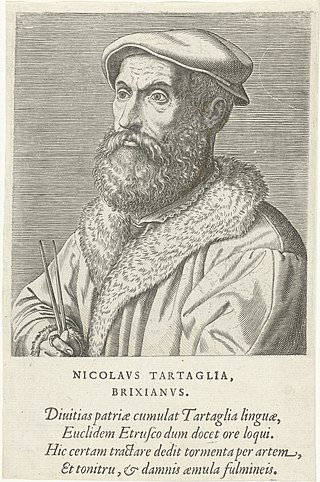Self-guided Sightseeing Tour #1 in Brescia, Italy
Legend
Tour Facts
3.9 km
58 m
Experience Brescia in Italy in a whole new way with our free self-guided sightseeing tour. This site not only offers you practical information and insider tips, but also a rich variety of activities and sights you shouldn't miss. Whether you love art and culture, want to explore historical sites or simply want to experience the vibrant atmosphere of a lively city - you'll find everything you need for your personal adventure here.
Activities in BresciaIndividual Sights in BresciaSight 1: Chiesa dei Santi Cosma e Damiano
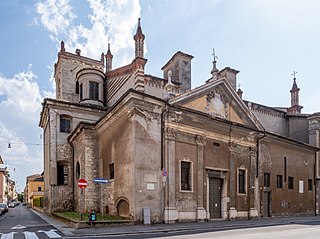
Santi Cosma e Damiano is a church in central Brescia, a region of Lombardy, Italy.
Sight 2: Chiesa di Santa Maria della Pace
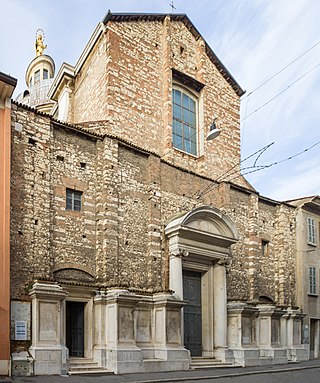
Saint Mary of the Peace Church is a Baroque-style, Roman Catholic church located on Via Pace in central Brescia, region of Lombardy, Italy. The church belongs to the Oratorians.
Sight 3: Chiesa di San Francesco d'Assisi
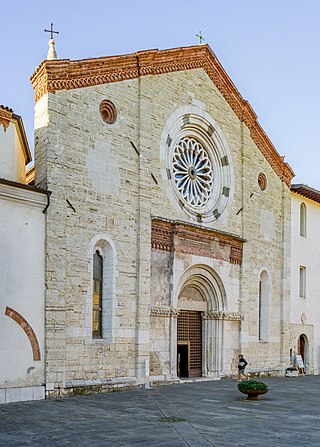
San Francesco is a Romanesque-Gothic style, Roman Catholic church and Franciscan monastery located on Via San Francesco d'Assisi in central Brescia, region of Lombardy, Italy.
Sight 4: Chiesa dei Santi Nazaro e Celso
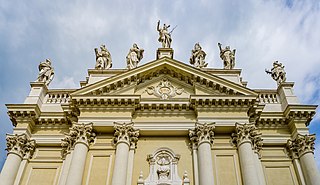
The church of Santi Nazaro e Celso is located on Corso Giacomo Matteotti, at the intersection with via Fratelli Bronzetti, in Brescia, Lombardy, Italy. The church contains the Averoldi Polyptych (1522), a masterwork of Titian.
Sight 5: Chiesa di Santa Maria dei Miracoli
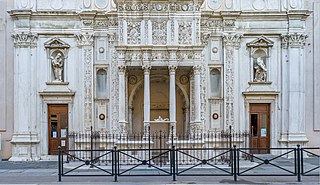
The church of Santa Maria dei Miracoli is located on Corso Martiri della Libertà in Brescia.
Sight 6: Chiesa di Santa Maria al Mercato del Lino
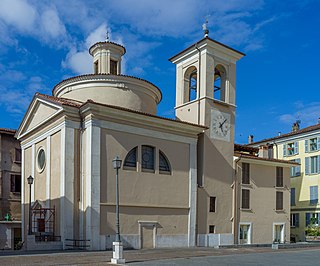
Madonna del Lino or Santa Maria del Mercato del Lino is a Roman Catholic church located on the Southwest corner of Piazza Mercato in Brescia, region of Lombardy, Italy.
Sight 7: Chiesa di Sant'Agata
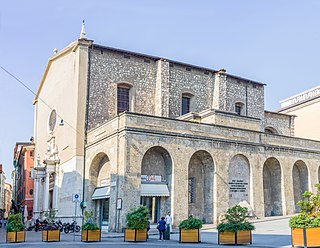
Sant'Agata is a 15th-century, Roman Catholic church located on Corsetto Sant'Agata at Piazza della Vittoria in Brescia, region of Lombardy, Italy.
Sight 8: Monumento ai caduti delle Dieci giornate di Brescia.
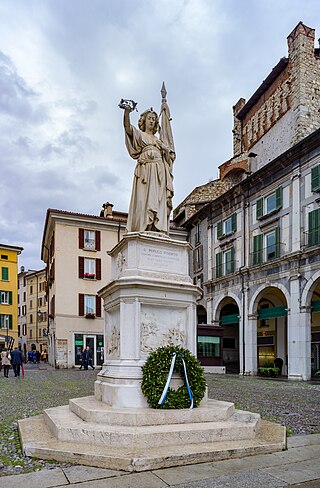
The Monument to Bella Italia or Bell'Italia, officially the Monument to the Fallen of the Ten Days of Brescia, is a marble monument located in the north-east branch of Piazza della Loggia in Brescia.
Sight 9: Concattedrale invernale di Santa Maria Assunta
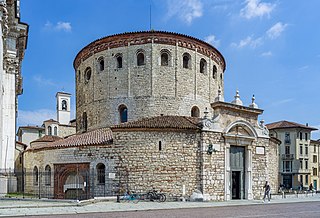
The Duomo Vecchio or Old Cathedral is a Roman Catholic church in Brescia, Italy; the rustic circular Romanesque co-cathedral stands next to the Duomo Nuovo of Brescia. It is officially known as the Winter Co-Cathedral of Santa Maria Assunta, while the adjacent main cathedral is known as the Summer Cathedral.
Sight 10: Cattedrale estiva di Santa Maria Assunta
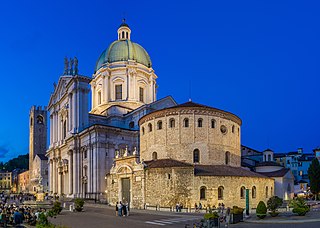
The Duomo Nuovo, or more correctly the summer cathedral of Santa Maria Assunta, is the main church of Brescia, the mother church of the diocese of the same name and an Italian national monument. It is located in Piazza Paolo VI, also known as Piazza del Duomo, and is part of the context of two cathedrals adjacent to each other, namely the old cathedral. The place of worship was erected between 1604 and 1825 on the area where the early Christian basilica of San Pietro de Dom stood, dating back to the V-VI century. In addition, it is the seat of a parish that is part of the pastoral area of Brescia Centro.
Sight 11: Chiesa di Santa Maria della Carità
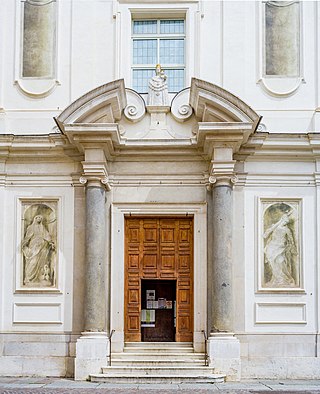
Santa Maria della Carità or just known as the Carità, or the church of the Buon Pastore, is a Baroque-style, Roman Catholic church located on Via dei Musei corner via Rosa in Brescia, region of Lombardy, Italy.
Sight 12: Scavi archeologici di palazzo Martinengo Cesaresco Novarino
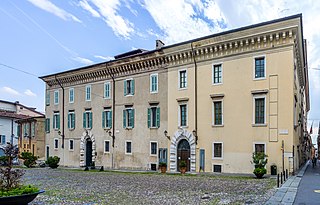
The archaeological excavations of Palazzo Martinengo Cesaresco Novarino in Brescia were opened in 1998 in the basement of the building, after eight years of work that involved the varied stratigraphy that affects the area below the building. The excavations have brought to light testimonies and finds ranging from prehistory to the Middle Ages, confirming the three-thousand-year history of Piazza del Foro and this area of the city of Brescia.
Wikipedia: Scavi archeologici di palazzo Martinengo Cesaresco Novarino (IT)
Sight 13: Foro Romano
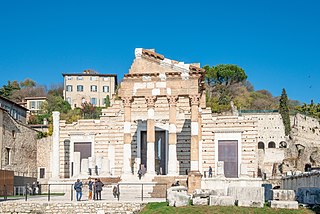
The Roman Forum of Brescia was the ancient main square of the city center of Brixia starting from the first century BC and later completed by Vespasian. Much of the original square is now traced from Piazza del Foro, while the remains of most of the buildings that overlooked it have been brought to light outside or in the basement of the buildings that currently surround the square. This monumental archaeological complex preserves the major public buildings of the Roman age in northern Italy and for this reason it has been declared a UNESCO World Heritage Site, part of the serial site "Lombards in Italy: the places of power".
Sight 14: San Marco Evangelista
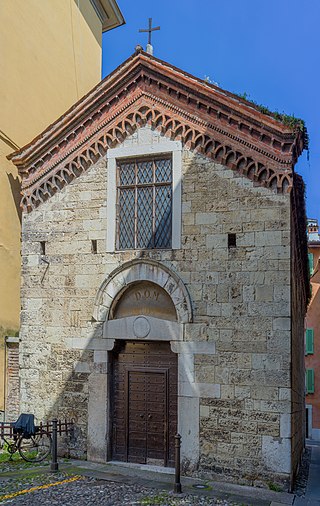
San Marco Evangelista is a Romanesque-style, Roman Catholic church located at the end of via Laura Cereto in central Brescia, region of Lombardy, Italy.
Sight 15: Chiesa di San Clemente
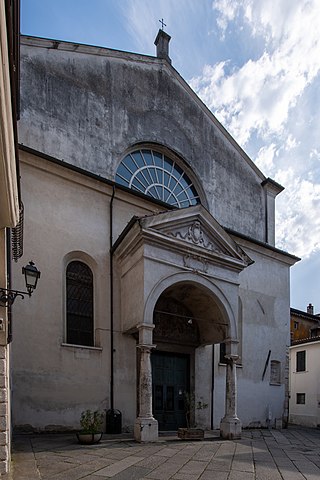
The church of San Clemente is an ancient Roman Catholic church located near the Piazza del Foro, in central Brescia, region of Lombardy, Italy.
Sight 16: Memoriale a Niccolò Tartaglia
Nicolo, known as Tartaglia, was an Italian mathematician, engineer, a surveyor and a bookkeeper from the then Republic of Venice. He published many books, including the first Italian translations of Archimedes and Euclid, and an acclaimed compilation of mathematics. Tartaglia was the first to apply mathematics to the investigation of the paths of cannonballs, known as ballistics, in his Nova Scientia ; his work was later partially validated and partially superseded by Galileo's studies on falling bodies. He also published a treatise on retrieving sunken ships.
Sight 17: Chiesa di Santa Maria in Calchera
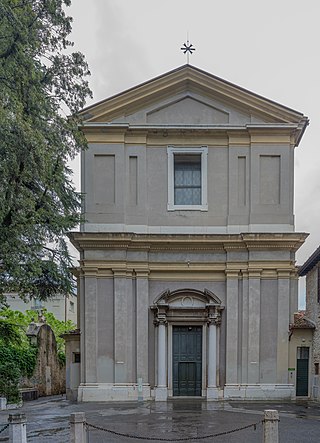
The church of Santa Maria in Calchera is a Catholic place of worship in Brescia, located in the south-west corner of the square of the same name, along Via Trieste, a short distance from Piazzale Arnaldo. Of very ancient origin, it was radically restored from the sixteenth century onwards, until the eighteenth century.
Sight 18: Chiesa di San Salvatore
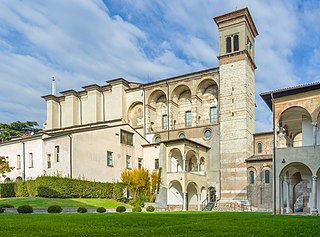
San Salvatore is a former monastery in Brescia, Lombardy, northern Italy, now turned into a museum. The monastic complex is famous for the diversity of its architecture which includes Roman remains and significant pre-Romanesque, Romanesque and Renaissance buildings.
Sight 19: Chiesa di San Zeno al Foro
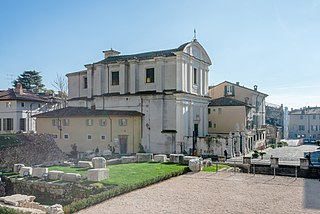
San Zeno al Foro is a church in center of the city of Brescia, situated in Piazza del Foro on the Via dei Musei, a few yards from the ruins of the Roman Capitoline temple in the city.
Sight 20: Tempio Capitolino
Get Ticket*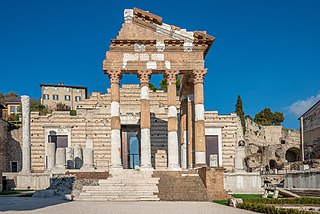
The Capitolium of Brixia or the Temple of the Capitoline Triad in Brescia was the main temple in the center of the Roman town of Brixia (Brescia), in Northern Italy, in the modern region of Lombardy. It is represented at present by fragmentary ruins, but is part of an archeological site, including a Roman theater and museum in central Brescia. It forms part of the Longobards in Italy: Places of Power UNESCO World Heritage Site inscribed in 2011.
Sight 21: Teatro Romano
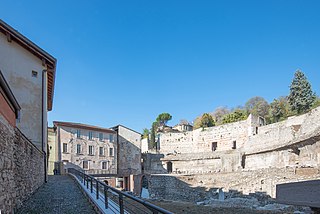
The Roman theater of ancient Brixia is a building located in the modern city of Brescia, near the Capitoline temple and the Forum square.
Share
How likely are you to recommend us?
Disclaimer Please be aware of your surroundings and do not enter private property. We are not liable for any damages that occur during the tours.
GPX-Download For navigation apps and GPS devices you can download the tour as a GPX file.
